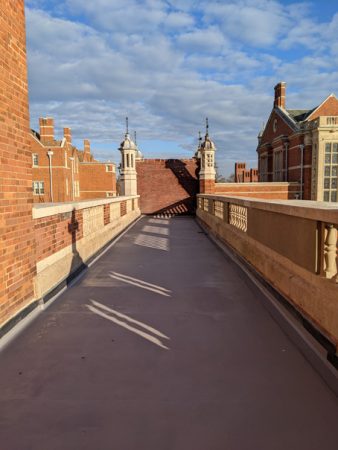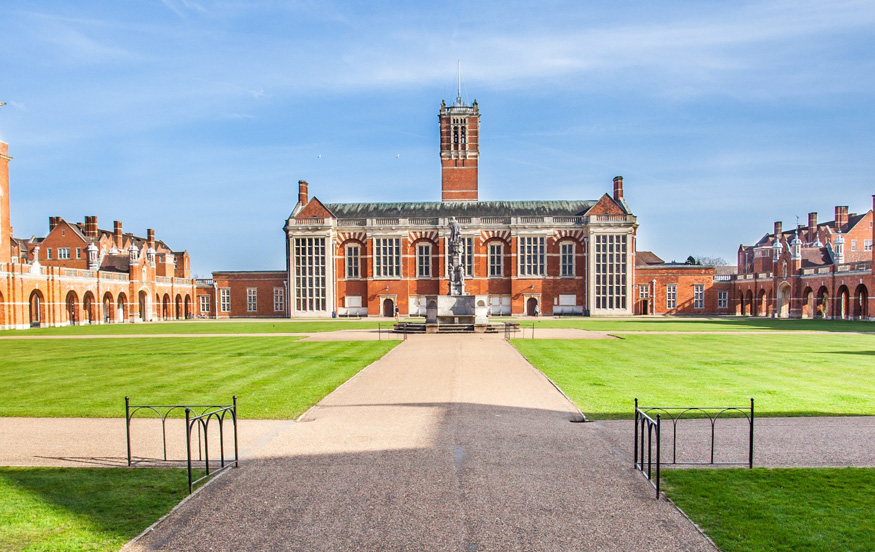Mastic asphalt is an integral part of our nation’s heritage, with the longevity and waterproofing properties necessary to preserve and protect historic and prestigious buildings across the UK.
Authentic materials for the conservation of heritage buildings and structures must not only retain the character, but also prove long-lasting and highly effective. Mastic asphalt, whilst a traditional waterproofing material that was first patented in 1837, offers durability and wear resistance far beyond modern alternatives which is why it is so frequently specified for refurbishment projects by the National Trust and English Heritage, as well as other public and private owners of prestigious buildings.
Traditionally consisting of graded limestone aggregate bound together with bitumen, today’s mastic asphalt systems are now manufactured using advanced polymer modified formulations to ensure all the performance characteristics of traditional asphalt systems, with the added benefits of increased flexibility, enhanced handling and sustainability. The incorporation of modern polymers into mastic asphalt systems has helped lead to its resurgence in the construction industry.
Mastic Asphalt Council (MAC) contractor member Sussex Asphalte has been involved in an impressive mastic asphalt project at Christ’s Hospital independent school in Horsham, West Sussex. Carried out in September 2021, the refurbishment project at this heritage-rich site was so impressive that it was shortlisted for the ‘Best Heritage Project’ at the recent MAC Awards 2022 hosted at London’s Royal Horseguards Hotel.
Established in 1552, Christ’s Hospital is the UK’s leading charitable school and the largest bursary charity, providing free or substantially reduced cost places to over 630 of its 900 pupils each year.
Christ’s Hospital is one of the oldest boarding schools in England and the building is Grade II* listed. Its name derives from the fact that it is one of the famous Royal Hospitals of London, whose foundation marked the beginning of the social services in Tudor England. The school was the result of a foundation by Henry VIII and confirmed by Edward VI, assisted by Nicholas Ridley, Bishop of London and Sir Richard Dobbs, Lord Mayor of London.
The roof renovation was carried out by Sussex Asphalte as part of a wider school refurbishment and one of the key stipulations was to help Christ’s Hospital preserve its historic estate. Sussex Asphalte worked in conjunction with Kevin Bashford of MacConvilles of Brighton.
The project involved stripping the 250m² of existing defective coverings down to the flat concrete slab, and laying new mastic asphalt in two coats, finished with two coats of solar reflective paint.
 The stripping of the existing mastic asphalt coverings posed various challenges. Most notably, the stripping itself was made extremely difficult due to the multiple layers of varying materials used to coat and overlay the area over the years. Upon removal, Sussex Asphalte’s operatives uncovered multiple layers of mastic asphalt, felt and liquid roof coverings. In addition to this, the removal of the existing waterproofing exposed electrical cabling feeding the lighting below. Additional care had to be taken when breaking out the existing build up to ensure no damage to the conduit or cables within. Operatives also had to be cautious when laying the new asphalt, ensuring the conduits were suitably protected to avoid them melting from the residual heat of the fresh mastic asphalt covering.
The stripping of the existing mastic asphalt coverings posed various challenges. Most notably, the stripping itself was made extremely difficult due to the multiple layers of varying materials used to coat and overlay the area over the years. Upon removal, Sussex Asphalte’s operatives uncovered multiple layers of mastic asphalt, felt and liquid roof coverings. In addition to this, the removal of the existing waterproofing exposed electrical cabling feeding the lighting below. Additional care had to be taken when breaking out the existing build up to ensure no damage to the conduit or cables within. Operatives also had to be cautious when laying the new asphalt, ensuring the conduits were suitably protected to avoid them melting from the residual heat of the fresh mastic asphalt covering.
Though the life expectancy of mastic asphalt has been estimated at 50-60 years by the Building Research Establishment (BRE), there are many cases of asphalt roofs providing effective waterproof protection for up to 80-100 years. In terms of quality of workmanship, mastic asphalt is one of the few construction activities still regarded as a ‘craft trade’. The skilled work involves ensuring that asphalt is at the correct temperature, and then spreading it using traditional techniques to coat the surface. A thermoplastic material that changes shape when heated, mastic asphalt cures to form a hard, durable, finished product to suit a wide range of applications.
To maintain the industry’s reputation and ensure high quality applications for every single project, only trained applicators are permitted to install mastic asphalt under the Mastic Asphalt Council’s strict rules. Being a MAC member enhances the reputation of a contractor and gives a badge of quality and assurance that they meet very highest of standards with regards to factors such as trading and credit history, insurance policies and quality of workmanship.
This article featured within the September 2022 edition of Roofing Today magazine – click here to view the article.

